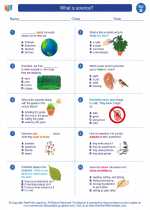Metabolism
Metabolism refers to all the chemical reactions that take place within an organism to maintain life. These processes allow organisms to grow, reproduce, respond to their environment, and maintain their structures.
Types of Metabolism
There are two main types of metabolism:
- Anabolism: This involves the building up of complex molecules from simpler ones. It requires energy and is involved in processes such as the synthesis of proteins and the storage of energy in the form of glycogen or fat.
- Catabolism: This involves the breakdown of complex molecules into simpler ones, releasing energy in the process. Processes such as digestion and cellular respiration are part of catabolism.
Factors Affecting Metabolism
Several factors can affect an organism's metabolism, including:
- Genetics: Each organism has a unique genetic makeup that influences its metabolic processes.
- Age: Metabolism often slows down with age, as the body's energy needs decrease.
- Physical Activity: Exercise and physical activity can increase metabolism by burning energy and building muscle mass.
- Diet: The type and amount of food consumed can impact metabolism, as different nutrients play various roles in metabolic processes.
Metabolism in Living Organisms
Metabolism is essential for the survival of all living organisms. In plants, metabolism is crucial for processes such as photosynthesis and the storage of energy in the form of starch. In animals, metabolism supports the conversion of food into energy, the growth of tissues, and the elimination of waste products.
Study Guide for Metabolism
When studying metabolism, consider the following key points:
- Define metabolism and its two main types: anabolism and catabolism.
- Understand the factors that can affect an organism's metabolism, such as genetics, age, physical activity, and diet.
- Explain the importance of metabolism in both plants and animals.
- Explore specific examples of anabolic and catabolic processes in living organisms.
By understanding the concepts and factors related to metabolism, you can gain a deeper appreciation for the essential role it plays in maintaining life.
[Metabolism] Related Worksheets and Study Guides:
.◂Science Worksheets and Study Guides Second Grade. What is science?

 Worksheet/Answer key
Worksheet/Answer key
 Worksheet/Answer key
Worksheet/Answer key
 Worksheet/Answer key
Worksheet/Answer key
 Vocabulary/Answer key
Vocabulary/Answer key
